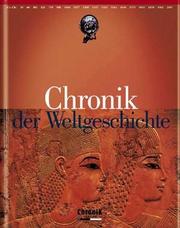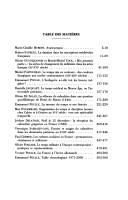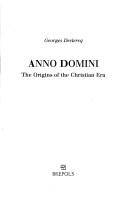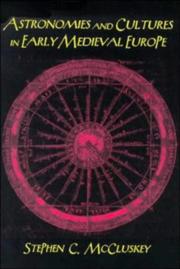| Listing 1 - 8 of 8 |
Sort by
|

ISBN: 357714579X Year: 2000 Publisher: Gütersloh/München : Chronik Verlag,
Abstract | Keywords | Export | Availability | Bookmark
 Loading...
Loading...Choose an application
- Reference Manager
- EndNote
- RefWorks (Direct export to RefWorks)
Chronology, Historical. --- Chronology, Historical. --- Chronology, Historical --- World history. --- Histoire universelle --- Chronologie historique --- Chronologie historique --- Histoire universelle --- Charts, diagrams, etc. --- Chronologie --- Tableaux, graphiques, etc
Book
Abstract | Keywords | Export | Availability | Bookmark
 Loading...
Loading...Choose an application
- Reference Manager
- EndNote
- RefWorks (Direct export to RefWorks)
Chronology, Historical --- Chronologie historique --- 930.24 --- 930.24 Historische chronologie --- Historische chronologie
Book
ISBN: 3876907667 Year: 2000 Publisher: München : Sagner,
Abstract | Keywords | Export | Availability | Bookmark
 Loading...
Loading...Choose an application
- Reference Manager
- EndNote
- RefWorks (Direct export to RefWorks)
Chronology, Historical --- Church Slavic prose literature --- Historiography --- Historiography --- Russian prose literature --- History and criticism --- History and criticism

ISBN: 3170151568 9783170151567 Year: 2000 Publisher: Stuttgart Kohlhammer
Abstract | Keywords | Export | Availability | Bookmark
 Loading...
Loading...Choose an application
- Reference Manager
- EndNote
- RefWorks (Direct export to RefWorks)
Chronology, Historical --- Calendar --- Chronologie historique --- Calendrier --- Early works to 1800 --- History --- Ouvrages avant 1800 --- Histoire --- 930.24 --- Historische chronologie --- 930.24 Historische chronologie

ISBN: 2804132870 9782804132873 Year: 2000 Publisher: Bruxelles : ©2000 De Boeck Université,
Abstract | Keywords | Export | Availability | Bookmark
 Loading...
Loading...Choose an application
- Reference Manager
- EndNote
- RefWorks (Direct export to RefWorks)
Calendars --- Astronomy --- Calendriers --- Astronomie --- History --- Histoire --- Chronologie [Historische ] --- Chronology [Historical] --- Dates --- Historical chronology --- History--Chronology --- Kalenders --- World chronology--History --- 529.309 --- Chronology --- Calendar --- History. --- Temps --- Calendrier (chronologie) --- Time measurements --- Mesure --- Histoire. --- 950 --- calendrier --- mesure du temps --- astronomie --- cultuurgeschiedenis --- histoire culturelle --- Acqui 2006

ISBN: 2900791332 9782900791332 Year: 2000 Volume: t. 157, 1999 Publisher: Paris : Genève : Champion ; Droz,
Abstract | Keywords | Export | Availability | Bookmark
 Loading...
Loading...Choose an application
- Reference Manager
- EndNote
- RefWorks (Direct export to RefWorks)
History as a science --- Annals --- Calendar [Gregorian] --- Calendar reform --- Calendar--Reform --- Calendrier grégorien --- Calendrier--Réforme --- Chronologie [Historische ] --- Chronologie historique --- Chronology [Historical] --- Dates --- Gregoriaanse kalender --- Historical chronology --- Historische chronologie --- History--Chronology --- Kalender [Gregoriaanse ] --- Kalender--Hervorming --- Kalenderhervorming --- Réforme du calendrier --- World chronology--History --- Time --- Time measurements --- Time perception --- Chronology --- Temps --- Perception du temps --- Chronologie --- History --- Histoire --- Mesure --- 930.24 --- 930.24 Historische chronologie --- Calendar -- Reform --- Calendrier (Chronologie) -- Réforme --- Calendrier -- Réforme --- Kalender -- Hervorming

ISBN: 2503510507 2503510515 9782503510514 Year: 2000 Publisher: Turnhout : Brepols,
Abstract | Keywords | Export | Availability | Bookmark
 Loading...
Loading...Choose an application
- Reference Manager
- EndNote
- RefWorks (Direct export to RefWorks)
Calendrier (chronologie) --- Tijdrekening --- Calendar --- Chronology, Historical --- Calendar reform --- Calendrier --- Chronologie historique --- History --- Early works to 1800 --- Histoire --- Ouvrages avant 1800 --- Réforme --- Dionysius Exiguus, --- 930.24 --- Historische chronologie --- Church calendar --- Church history --- Easter. --- History. --- 930.24 Historische chronologie --- Réforme --- Easter --- Church year --- Fasts and feasts --- Holy Week --- Chronology, Ecclesiastical --- Church chronology --- Ecclesiastical chronology --- Calendar, Ecclesiastical --- Computus ecclesiasticus --- Ecclesiastical calendar --- Heortology --- Religious calendars --- Christianity --- Dionysius Syrus, --- Exiguus, Dionysius, --- Syrus, Dionysius, --- Christian church history --- #gsdb8 --- Chronologie --- Calendriers --- Dionysius,

ISBN: 0521583616 9780521583619 Year: 2000 Publisher: Cambridge : Cambridge university press,
Abstract | Keywords | Export | Availability | Bookmark
 Loading...
Loading...Choose an application
- Reference Manager
- EndNote
- RefWorks (Direct export to RefWorks)
"Historians have long recognized that the rebirth of science in twelfth-century Europe flowed from a search for ancient scientific texts. But this search presupposes knowledge and interest; we seek only what we know to be valuable. The emergence of scholarly interest after centuries of apparent stagnation seems paradoxical." "This book resolves that seeming contradiction by describing four active traditions of early medieval astronomy: one divided the year by observing the Sun; another computed the date of Easter Full Moon; the third determined the time for monastic prayers by watching the course of the stars; and the fourth, the classical tradition of geometrical astronomy, provided a framework for the cosmos." "Most of these astronomies were practical; they sustained the communities in which they flourished and reflected and reinforced the values of those communities. These astronomical traditions motivated the search for ancient learning that led to the Scientific Renaissance of the twelfth century."--Jacket.
Astronomy, Medieval --- Astronomy --- Calendars --- Time measurements --- Astronomie médiévale --- Astronomie --- Calendriers --- Temps --- History. --- History --- Histoire --- Mesure --- 52 <09> --- 52 <09> Astronomie. Astrofysica. Ruimteonderzoek. Geodesie--Geschiedenis van ... --- 52 <09> Astronomy. Astrophysics. Space research. Geodesy--History of ... --- Astronomie. Astrofysica. Ruimteonderzoek. Geodesie--Geschiedenis van ... --- Astronomy. Astrophysics. Space research. Geodesy--History of ... --- Annuals --- Dates, Books of --- Chronology, Historical --- Yearbooks --- Almanacs --- Medieval astronomy --- Astronomie. Astrofysica. Ruimteonderzoek. Geodesie--Geschiedenis van . --- History of Europe --- anno 1100-1199 --- anno 500-599 --- anno 700-799 --- anno 400-499 --- anno 900-999 --- anno 800-899 --- anno 600-699 --- anno 1000-1099 --- Astronomie. Astrofysica. Ruimteonderzoek. Geodesie--Geschiedenis van .. --- Astronomie. Astrofysica. Ruimteonderzoek. Geodesie--Geschiedenis van --- Astronomie antique. --- Astronomie médiévale --- Astronomie médiévale. --- Astronomy, Medieval. --- Astronomy. --- Calendars. --- Culture --- Time measurements. --- Histoire. --- Mesure. --- Europe.
| Listing 1 - 8 of 8 |
Sort by
|

 Search
Search Feedback
Feedback About
About Help
Help News
News